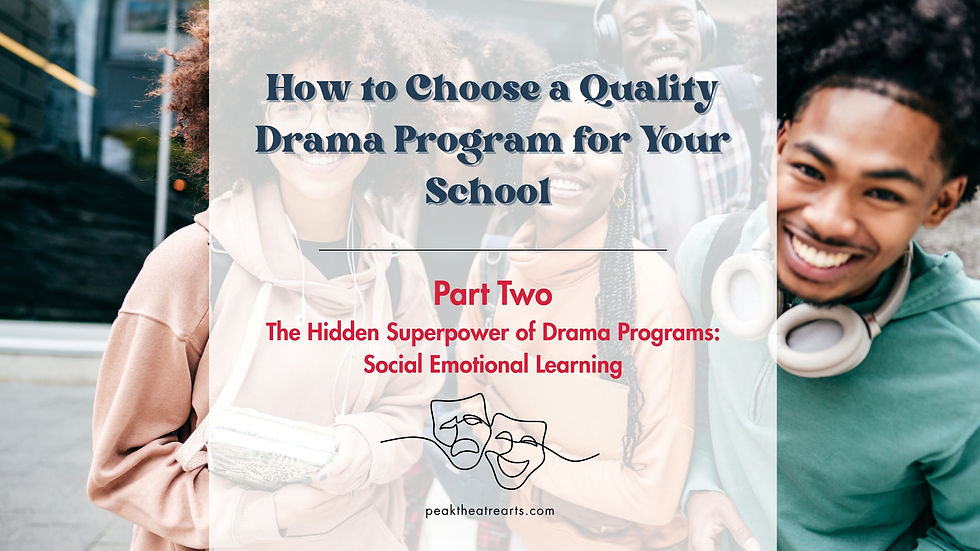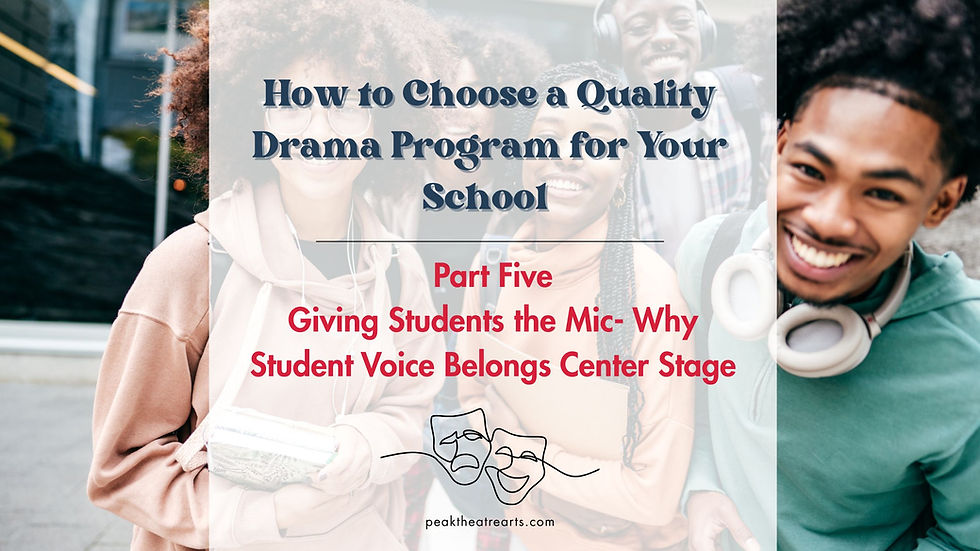The Hidden Superpower of Drama Programs: Social Emotional Learning
- Ms. A

- Jul 25, 2025
- 7 min read
Updated: Dec 6, 2025
A 7-Part Series on How to Choose a Quality Drama Program for Your School

✨ The best drama programs do more than teach performance — they grow the whole child.
Download The Spotlight Checklist™
Get the simple, powerful guide that helps you identify high-quality drama programs that honor students’ brilliance and align with your school or district goals.
The Hidden Superpower of Drama Programs: Social Emotional Learning
Table of Contents:
What is Social Emotional Learning?
The hidden superpower of drama programs is social-emotional learning. Social-Emotional Learning (SEL) is the process through which young people acquire and apply the knowledge, skills, and attitudes to:
Understand and manage emotions
Set and achieve positive goals
Feel and show empathy for others
Establish and maintain supportive relationships
Make responsible and caring decisions
According to CASEL, five interrelated core competencies guide SEL:
1. Self-Awareness: The ability to recognize one’s emotions, thoughts, and values and understand how they influence behavior, which includes:
Accurately assessing one’s strengths and limitations
Developing a well-grounded sense of confidence and purpose
2. Self-Management: The ability to regulate emotions, thoughts, and behaviors in different situations, which includes:
Managing stress
Controlling impulses
Motivating oneself
Setting and working toward personal and academic goals
3. Social Awareness: The ability to empathize with others from diverse backgrounds and cultures, which includes:
Understanding social norms
Recognizing family, school, and community resources
Demonstrating compassion and respect for others
4. Relationship Skills: The ability to establish and maintain healthy and rewarding relationships, which includes:
Clear communication
Active listening
Teamwork
Conflict resolution
Seeking and offering help when needed
5. Responsible Decision-Making: The ability to make caring and constructive choices about personal behavior and social interactions, which includes:
Considering ethical standards
Evaluating the consequences of actions
Reflecting on the well-being of self and others
These competencies work together to support academic achievement, positive mental health, and meaningful connections in both school and life.
📝 Reference: Collaborative for Academic, Social, and Emotional Learning (CASEL). (2020). What is SEL? Retrieved from https://casel.org/fundamentals-of-sel/
Why Does SEL Matter in Out-of-School Time?
Out-of-school-time programs like afterschool clubs, summer camps, and community programs are uniquely positioned to nurture Social-Emotional Learning (SEL). These are spaces where students can show up as their full selves, free from the academic pressures of grades, standardized tests, and rigid classroom routines. That freedom creates powerful opportunities for emotional growth.
Unlike the school day, which is often tightly scheduled and content-driven, out-of-school-time programs offer unstructured moments, creative expression, and deeper peer interaction. These are ideal conditions for developing the social and emotional skills students need to thrive.
Why Drama Programs Are Especially Powerful for SEL
Drama programs align naturally with SEL because, at the core, drama experiences are about being human. They invite students to explore identity, relationships, and emotions in a safe, supportive environment.
In drama programs, students engage in:
Role Play that Fosters Empathy
When students play a historical figure, a fairytale, or a fictional character, they learn to see the world from another perspective. This cultivates empathy, understanding, and compassion for people who may think, feel, or live differently than they do.
Collaboration that Strengthens Communication and Trust
Drama is never a solo activity. Students are constantly navigating group dynamics, teamwork, and shared responsibility. They practice listening, compromising, taking turns, and resolving conflict.
Reflection that Encourages Self-Understanding
A powerful moment in any drama class happens after the scene ends when students are invited to reflect. “What did I feel in that moment?” “How did my character’s choices affect the group?” These reflections help students become more self-aware and thoughtful about themselves and the people around them.
Creative Risk-Taking that Builds Confidence
Theatre pushes students outside their comfort zones, whether through performance or learning how to speak up, they’re building resilience, courage, and the confidence to keep going even when it feels hard. Drama permits them to fail forward, knowing they are supported by the ensemble and trusted by their teaching artist.
When SEL is intentionally embedded in out-of-school-time drama programs, students don’t just rehearse scenes; they rehearse life. They practice the emotional, relational, and problem-solving skills they’ll need long after the curtain falls.
These programs become more than extracurricular; they become essential spaces for growing whole, emotionally grounded, and connected human beings.
What the Research Says
Strong Social-Emotional Learning (SEL) programs have a positive impact on students’ lives academically, emotionally, and socially. According to decades of research compiled by the Collaborative for Academic, Social, and Emotional Learning (CASEL), SEL isn’t just a “nice add-on.” It’s one of the most impactful educational strategies we have.
Here’s what the data tells us:
Academic Benefits
A landmark meta-analysis of over 200 SEL studies involving more than 270,000 students found that participants in high-quality SEL programs demonstrated an average 11-point gain in academic achievement compared to their peers who did not receive SEL instruction. (Durlak et al., 2011)
Why? When students feel emotionally safe and connected, they’re more open to learning, more engaged in class, and more likely to persist through challenges.
Emotional Well-Being
Students in SEL programs show lower rates of anxiety, depression, and emotional distress, as well as improved self-esteem and emotional regulation skills. They’re better able to cope with stress and bounce back from setbacks.
Drama, in particular, gives students a safe and expressive outlet for their feelings, offering real-time emotional processing through storytelling, character exploration, and ensemble collaboration.
Social Connectedness and Belonging
Students who experience quality SEL also report stronger relationships with peers and adults and a greater sense of belonging at school. That connectedness is a powerful protective factor that supports resilience and long-term well-being.
In drama, those connections are deepened every time students:
Build something together
Listen to each other on stage
Celebrate each other’s vulnerability
Share honest reflections in rehearsal debriefs
Theatre becomes a microcosm of what a supportive, emotionally intelligent community can look like. A hidden superpower of drama programs is that social emotional learning is the key.
📝 References: Durlak, J. A., Weissberg, R. P., Dymnicki, A. B., Taylor, R. D., & Schellinger, K. B. (2011). The impact of enhancing students’ social and emotional learning: A meta‐analysis of school‐based universal interventions. Child Development, 82(1), 405–432.CASEL (2020). Fundamentals of SEL. Retrieved from https://casel.org/fundamentals-of-sel/

What SEL looks like at Peak Theatre Arts?
Students do more than act out stories; they develop critical social-emotional skills and cultural awareness that empower them to navigate both their inner worlds and their communities with empathy and resilience.
Our approach consists of:
Daily check-ins and community-building rituals that help students settle into their bodies and voices while honoring how they feel that day.
Group agreements are co-created with students to set a tone of mutual respect, care, and emotional safety.
Character exploration that asks deeper questions: “What is this character feeling, and why? What might their choices teach us about ourselves?”
Collaborative scene work that calls on students to listen closely, adapt, compromise, and lead with empathy.
Intentional reflection prompts are woven throughout every lesson, such as:
“What did you learn about yourself in that role?”
“How did it feel to be part of this ensemble?”
“What was hard today, and what helped you push through it?”
What to Ask When Choosing a Drama Program
If you’re wondering how to choose a quality drama program for your school or community, one of the most important things to consider is how it supports social-emotional learning.
Here are a few thoughtful questions to guide your evaluation:
“How does this program support students’ emotional development?”Look for programs that go beyond performance skills to nurture empathy, resilience, and self-awareness intentionally.
“Are there opportunities for students to reflect on themselves and others?”Reflection is a powerful tool for growth. The best drama programs create space for students to connect the story to their own lives.
“How is emotional safety and trust built in the classroom or rehearsal space?”A quality program fosters community through routines, group agreements, and care-filled facilitation, making sure every child feels seen, safe, and valued.
When choosing a drama program, remember: you’re not just selecting an activity, you’re choosing a learning environment that can shape how students see themselves and others.
The right program will prioritize the whole child, not just their ability to memorize lines or perform, but their ability to grow, connect, and thrive.
Coming Up in Part Three: Building Drama Programs that Sustain Culture and Identity
Is your drama program leaving student voices out? Keep reading—here’s why it can’t.
What stories are your students telling, and whose stories are being left out?
In many school-based theatre programs, the default canon still centers Eurocentric classics like Shakespeare, Peter Pan, or The Little Mermaid. While these works have artistic value, they often fail to reflect the identities, languages, and lived experiences of today’s students, especially those from Black, Brown, Indigenous, and multilingual communities.
A truly inclusive drama program goes beyond casting; it starts with the curriculum. It affirms student identities, centers underrepresented voices, and invites young people to explore the world through stories that reflect them.
In Part Three, we explore why culturally responsive and inclusive drama education isn’t just a nice-to-have; it’s a necessary investment for equitable learning and deep engagement.
Grab The Spotlight Checklist™
A simple, powerful tool I created to help you clearly identify programs that honor students’ brilliance, support their growth, and align with your school or district goals.
Inside the checklist, you’ll find what to look for when:
Reviewing or selecting enrichment vendors
Advocating for arts funding or expanded arts access
Aligning programs with district initiatives and quality standards
Setting expectations with teaching artists and partners
Strong drama programs don’t just fill time — they create joyful spaces where imagination, culture, and community come alive.
Download The Spotlight Checklist™ and choose programs that truly serve your students.



Comments